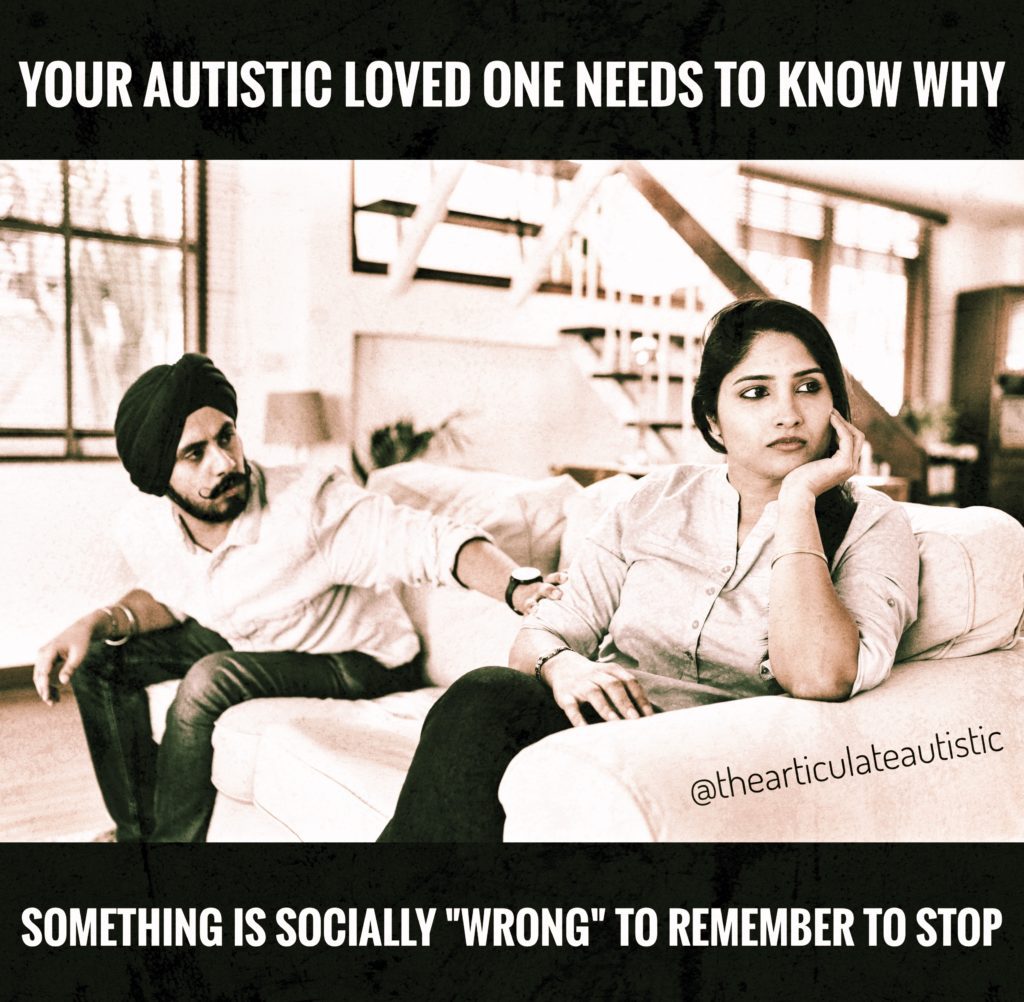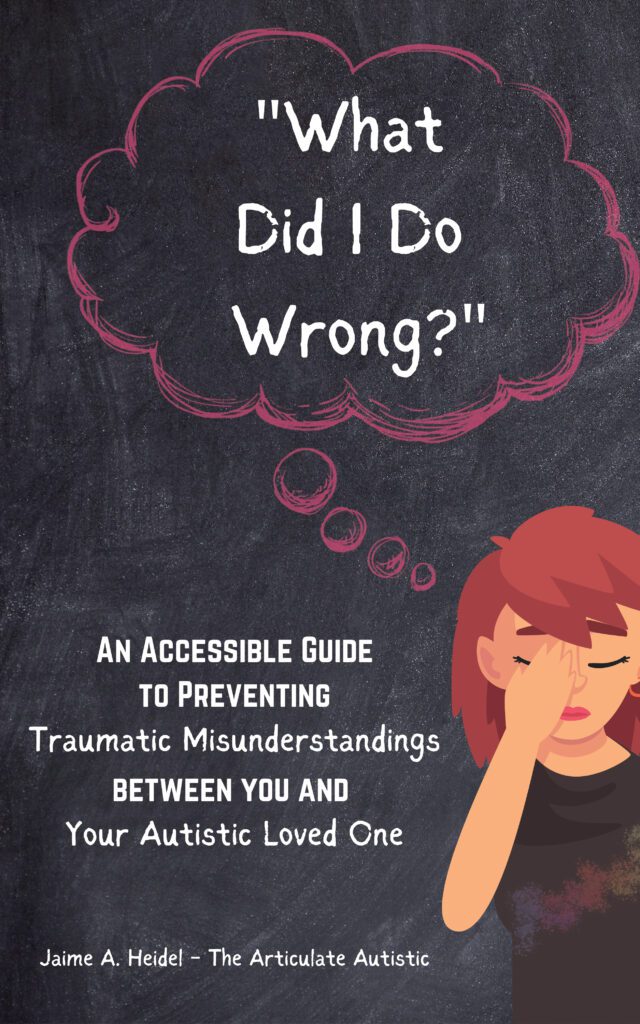I Need an Emotional Connection To Why Something Is Considered Socially Wrong To Understand It and Remember To Stop Doing It (an Autistic Perspective)

“You should say you’re sorry!”
“Why?”
“Because what you did was wrong!”
“Why?”
“Don’t talk back to me!”
“Huh?”
If you’re autistic, you probably just cringed as confusing and traumatic memories of conversations past bubbled to the surface. If you’re neurotypical, you might be staring at your screen in open-mouthed shock at the familiarity of this frustrating exchange.
Whatever the case, we need to fix this particular miscommunication between the neurotypes right now.
Many neurotypical people equate asking questions with insubordination of some kind. I can’t speak for neurotypical people, but that is NOT the case with most of us autistics.
When we ask “why”, we are looking for more information in an attempt to understand you and your feelings more clearly. That is it. There is NO hidden motivation. None.
(Also, it took many of us into our adult years to even understand that asking a question would have any other purpose other than to get an answer.)
So, that’s the first part. With me so far? OK, good.
The second part is this. Oftentimes, neurotypical people mistakenly believe that autistic people don’t have empathy because we are not responding the way a neurotypical person would to the same social cues and situations. Because of this, when something offensive is said, confusion and even defensiveness (many of us have been deeply traumatized by a lifetime of misunderstandings) rather than the expected apology is often the response one gets from the autistic person in the exchange.
It is not because we don’t have empathy, it’s because we don’t have all the information we need to understand and connect.
See, NT (neurotypical, not autistic) people have the “social playbook”, if you will, that autistic people were just not gifted with. Therefore, if an NT person makes a social mistake (or just says or does something cruel on purpose for whatever reason), they already have the information in their brain that tells them, “Oh, I shouldn’t have said that because _________.” So, when somebody “calls them out” on what they said or did, it is understood that they, the person being “called out”, knows what they did wrong and either just doesn’t care or couldn’t control their emotions in that moment. Since the social information is already presumed to be there, NT people skip over any explanations because they wouldn’t think there would be a need for one.
This is where the “huh” and “why” and “what do you mean” come from in the case of the autistic person. It’s not us trying to wiggle out of a bad situation or “act innocent”, we actually ARE innocent of intentional wrongdoing, and we’re trying to figure out why everybody is angry with us all of a sudden.
Furthermore, as I mentioned above, many of us will have an instant trauma response to perceived anger, frustration, or disgust coming in our direction, and our response may come out defensively because we’re terrified of being physically or emotionally punished for our transgressions (even if we don’t understand what we were perceived to have done wrong).
Again, we are only asking questions so we can catch up to where you are! Also, and this is very important, once we get to where you are and we have all the information, we can finally make an emotional connection to what you’re offended by and make amends if need be.
Once more, this isn’t because we don’t have the empathy or the emotional capacity to care about others, it’s because we genuinely didn’t know what we said or did was considered wrong by neurotypical social standards, and we need to in order to make that critical connection and remember not to make the same social mistake in the future.
It may be difficult for you to help us connect the dots in the moment, especially if you’re hurt or shocked by something we’ve said or done, but in order for many of us to make that emotional connection and cement a logical reason in our brains as to why we should not have said or done the thing, we won’t likely understand why you’re upset. Furthermore, if we just apologize for hurting you, that’s all well and good, but we’ll probably make the same mistake again because we won’t have enough logical information and the emotional connection necessary to avoid doing that.
This, unfortunately, is yet another thing that makes us look like we don’t care because we keep repeating the same mistakes, but it’s not that we don’t care, we don’t understand. Also, and this is the painful irony, any attempts to understand by asking “why” are usually met with more anger and no answers, which keeps us from learning the critical information we need so we don’t end up hurting your feelings again. And round and round we go until a relationship is severed and somebody ends up in the psychiatric unit (usually the autistic person) of their local hospital.
Like I’ve said in previous blog posts, it’s pretty uncommon for an autistic person to do things out of malice. It’s just not our way. We’re very blunt, and we may have atypical facial expressions or tones of voice that may make it look as though we are cold and uncaring, but that, in most cases, couldn’t be further from the truth.
We care. We just socialize and process the world differently. What seems offensive to you, a neurotypical, may be just conversation to us. Please keep that in mind when interacting with your autistic loved one, and remember to always answer any “why” questions.
Learn more about how your autistic loved one thinks, feels, and processes the world by picking up your copy of my book, “What Did I Do Wrong?”




So, here is potentially something going on in the neurotypical mind in these exchanges: we often don’t have an explanation to give, particularly one that will satisfy what you’re looking for. Since “because that’s just how it is” is often the best explanation we have for something we intuitively understand, and really have no logical explanation for other than “that’s just how things are” we are at a loss to effectively communicate something we literally never have to think about. Furthermore, interpersonal interactions are messy and complicated because emotions get involved, such as a family heirloom getting broken. I can appreciate it as an unintended accident, however, at the exact same time that item has an emotional attachment to a specific relative such that the item getting damaged or broken in any way, feels like they’ve just died all over again. The grief is just as fresh. This is why your intentions and explanations matter less in the moment than the fact that the item is broken and the connection with an absent relative it represented is lost (also that connection is why I wanted the object visible and accessible, not packed somewhere in a box to prevent damage to it). This is a situation that has played out in many ways between me and my autistic daughter. How do you teach that the response I want from my daughter in that instance is “I know how much that item meant to you, and I’m sorry I broke it accidentally because I wasn’t aware of where my body was in relation to it. I’ll help you clean up the mess I made”. Instead of being instantly triggered by my very emotional reaction and focused on being defensive about their intent, when the issue that has to be dealt with is the fact a cherished item is now lost, not whether they meant to do it or not?
Kim, I really appreciate the time you took to explain your POV as a neurotypical person. That’s very helpful. You asked, “How do you teach that the response I want from my daughter in that instance is “I know how much that item meant to you, and I’m sorry I broke it accidentally because I wasn’t aware of where my body was in relation to it. I’ll help you clean up the mess I made”. Instead of being instantly triggered by my very emotional reaction and focused on being defensive about their intent, when the issue that has to be dealt with is the fact a cherished item is now lost, not whether they meant to do it or not?”
Short answer: You can’t.
Here’s why. If your daughter were to ask me, “How do I make my mom not have an emotional response to a broken family heirloom?” I’d tell her, you can’t. That’s not how your mom’s brain and emotions work. The same goes for your daughter. It’s not that she doesn’t care or doesn’t have feelings, but her brain and emotions work differently. Neither of you can make the other think or feel like the other. That’s not possible. Expecting this is the first step to emotional ruin on both sides.
Instead, work on understanding each other’s perspective. Your daughter will probably never say the words the way you phrased them because that’s inauthentic. They aren’t her words. However, you can work together to help your daughter understand how you’re experiencing an event. There’s a few ways to do this, and it depends on the autistic person as to how best to proceed. It would be too much to type here, and I’d need to get to know you both better.
If you’d like to explore this further, we can set up a consultation. Here’s the link to my booking page: https://calendly.com/thearticulateautistic/60-minute-video-translation-session?month=2024-03